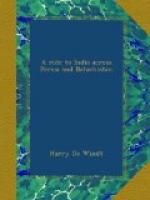The trade of Sonmiani is, as may be imagined, insignificant. Most of the low dark stalls were kept for the sale of grain, rice, salt, and tobacco, by Hindus; but I was told that a brisk trade is done in fish and sharks’ fins; and dried fruits, madder, and saffron, sent down from the northern districts, are exported in small quantities to India and Persia. In the vicinity are some ancient pearl-fisheries of considerable value, which were once worked with great profit. These have been allowed to lie for many years undisturbed, owing to lack of vigour and enterprise on the part of those in power in the state. Here is a chance for European speculators.
By a well in the centre of the village stood some young girls and children. The former were decidedly good looking, and one, but for the hideous gold nose-ring, [B] would have been almost beautiful. Here, as elsewhere in Baluchistan, the women present much more the Egyptian type of face than the Indian—light bronze complexions, straight regular features, and large, dark, expressive eyes. None of these made the slightest attempt at concealment. As we passed, one of them even nodded and smiled at Chengiz, making good use of her eyes, and disclosing a row of small, pearly teeth. Their dress, a loose divided skirt of thin red stuff, and short jacket, with tight-fitting sleeves, open at the breast, showed off their slight graceful figures and small, well-shaped hands and feet to perfection. Chengiz, pointing to the group, smiled and addressed me in a facetious tone. “He wants to know if you think them pretty,” said my interpreter; but I thought it best to maintain a dignified silence. The chief of Sonmiani was, for a Mohammedan, singularly lax.
A kind of rough pottery is made at Sonmiani, and this is the only industry. Some of the water-jars were neatly and gracefully fashioned, of a delicate grey-green colour; others red, with rude yellow devices painted on them. The clay is porous, and keeps the water deliciously cool.
By four o’clock next morning all was ready for a start. The caravan consisted of eighteen camels, four Baluchis, Kamoo, and Gerome, with an escort of ten soldiers of the Djam of Beila, smart-looking, well-built fellows in red tunics, white baggy trousers, and dark-blue turbans. Each man, armed with a Snider rifle and twenty rounds of ammunition, was mounted on a rough, wiry-looking pony. As we were starting, Chengiz Khan rode up on a splendid camel, and announced his intention of accompanying us the first stage, one of eighteen miles, to Shekh-Raj.
Here the honest fellow bade us good-bye. “The sahib will not forget me when he gets to India,” he said, on leaving, thereby implying that he wished to be well reported to the Indian Government. “But take care of Malak; he is a bad man—a very bad man.”




